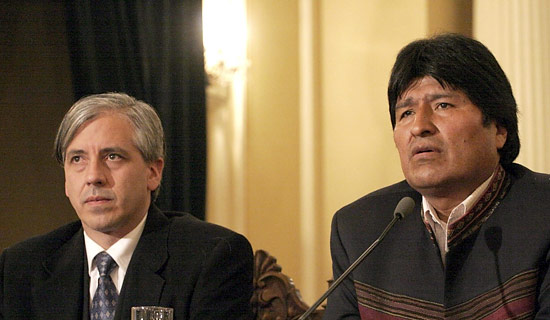President Evo Morales of Bolivia agrees to stand in proposed recall vote
May 9, 2008 - Intl Herald Tribune (Associated Press)

(above) President Evo Morales of Bolivia, right, and Vice President Alvaro Garcia Linera attending a press conference at the presidential palace in La Paz, Bolivia on Thursday. (Photo: Joao Padua/The Associated Press)
LA PAZ, Bolivia: President Evo Morales agreed Thursday to stand for election in a nationwide recall vote, gambling that Bolivians will re-elect him after just two years in office and shore up support for his pending reforms.
Morales first proposed a nationwide recall referendum last December amid a fierce political battle over his draft constitution, which would give Bolivia's long-oppressed indigenous population greater power.
The idea seemed to have been forgotten until Thursday, when an opposition-controlled Senate passed a bill ordering a referendum be held within 90 days. Morales pledged to sign the measure.
"If we politicians can't agree, it's best that the population decide our destiny," Morales said in a nationally televised address.
The measure would require Morales and Bolivia's nine state governors to win both more votes and a greater percentage of support than they did on a 2005 ballot. If they fall short, they will have to run again in a new general election.
Bolivian state governors did not immediately react to the president's announcement, but most have previously said they would participate in such a vote.
Morales, Bolivia's first indigenous president, would face recall at arguably the most difficult moment of his young presidency, following a key electoral victory for opponents in Santa Cruz, Bolivia's biggest and richest state.
In a May 4 referendum there that Morales deemed illegal, voters overwhelmingly backed a declaration seeking greater autonomy from his leftist government.
Morales won the presidency with 53.7 percent of the vote in December 2005, a mandate in a country where presidents sometimes eke into office with far less than a majority on multi-candidate ballots.
Opinion polls show his popularity still hovers above 50 percent, and telephone-based surveys generally reach only city dwellers, excluding Morales' strong base in the poorer countryside.
But state governors battling for increased autonomy have replaced traditional political parties as Morales' most powerful opponents.
His opposition is strong in Santa Cruz and the nation's eastern lowlands, but Morales is wagering that a recall will help his Movement Toward Socialism party pick off a governorship or two in the country's western highlands — particularly in La Paz, Bolivia's most populous state and a Morales stronghold now run by an opposition governor.